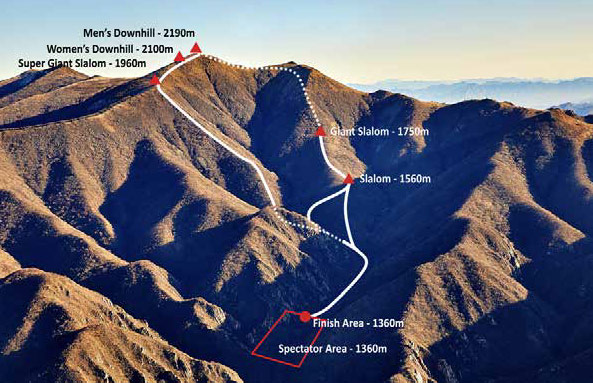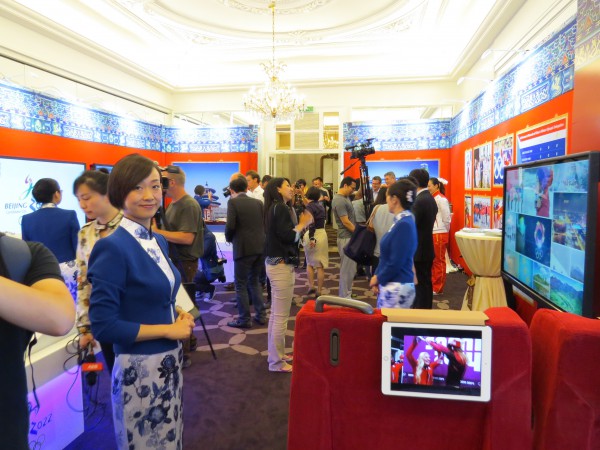Reporting from Zhangjiakou, China – Should Beijing host the Olympic Winter Games in 2022, athletes competing at the Zhangjiakou zone will be inspired by historical vistas of the Great Wall of China.
On the third day of the International Olympic Committee’s (IOC) Evaluation Commission visit to China to explore the Beijing 2022 Olympic bid, Alexander Zhukov and his team traveled 245 km northwest from Beijing to the Olympic snow cluster.

The temperature in the region soared to 18 degrees Celsius under bright skies Thursday but artificial snow covered ski runs early in spring. IOC members enjoyed the sunshine and engaged in a playful snowball fight as they toured the facilities of the Genting Secret Garden Resort, proposed site of Snowboard, Freestyle Skiing, the Mountain Media Centre and the Olympic Village. They also asked some digging questions to the IOC experts.
Later, a visit to the site of the proposed Ski Jump, Nordic and Cross-Country event sites revealed Zhangjiakou’s iconic connection: cross country skiers will compete in the shadow of the Great Wall of China while ski jumpers can draw inspiration from of one of the wonders of the world as they prepare to compete.
The section of the Great Wall adjacent to the venue was built during the Ming Dynasty and has suffered deterioration, but a government program will restore the structure to its original form in time for the Games offering a breathtaking setting for the broadcast of the events.

The construction of a new, efficiently routed highway will reduce the effective distance between the Beijing Athletes’ Village and the Zhangjiakou Zone to 161 km. A bullet train railway to be built by 2019 will hurry passengers from Beijing to the Zhangjiakou Taizicheng Olympic Village Station in 50 minutes and a further five minutes to Chong Li Station which is 2 km from the Medals Plaza.
The Ski Jump and Biathlon venues are scheduled to be constructed whether Beijing hosts the Games or not, but the Cross Country venue is contingent on Beijing landing the Games.
Five ski resorts already exist in the area and the Genting Resort was built in 2010, but the promising winter sport cluster is still a work in progress. Venues are to be built and many vacant areas are ready for development including the Athlete’s Village that organizers say will be constructed regardless of the outcome of IOC vote in July. A tree planting program is adding green space to the hillsides in areas that are lacking vegetation.

The climate is dry and snow is minimal in the area but with the aid of snow making equipment and water reservoirs, planners say the snow base will be sufficient on all runs at Games time.
The Olympic Winter Games is seen as an excellent opportunity for the industrial region of Zhangjiakou, home to almost 4.3 million people. Known for its production of steel and coal, as well as a grape wine industry, the city sees the Olympics as an opportunity to shine and set itself apart from Beijing. The bid is popular among residents.
One resident told GamesBids.com that she felt the 2008 Summer Games did a lot for Beijing at the time but has left a void in the region since, especially in Zhangjiakou which gained no benefit from those Games. She hopes a 2022 Games will change that.
The IOC continues its evaluation Friday before the official visit wraps up Saturday.





